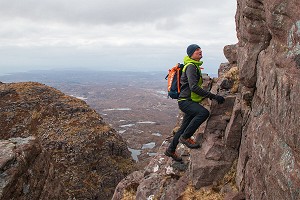
Gregory Zulu LT 20
Coming in various capacities, and both men's and women's versions (Zulu and Jade), this versatile walker's day pack prioritises comfort and ventilation, says John McKenna.
Deuter might be best known for their solid walking and mountaineering packs, but the German brand has for the first time recently branched out into running vest/packs too. Has the move proved a success? Here we're looking at the two current models in the line-up, the Ascender 7 and Ascender 13.
Given its size, we feel the Ascender 13 isn't purely a running thing, but crosses over very happily into lightweight hillwalking too. As a hillwalking lightweight and a rather less focused runner, Dan Bailey puts the larger version through its paces, and finds both good and bad.
On the other hand, the smaller and lighter 7-litre version will be of most interest to committed runners. As the keenest runner on the gear team, Rob Greenwood offers his thoughts on this model. But is he convinced?
Since they've used the packs in rather different ways, here each reviewer gives their own particular perspective - Rob's based on more hardcore distance running, and Dan's on a more generalist mix of hill running and hillwalking. On the big picture, however, they're agreed:
Pros
Cons
Ethics and environment
Deuter is a member of the Fair Wear Foundation, an independent verification initiative cooperating with companies and factories to improve labour conditions, especially in low-wage countries. For many years the company has also used a single factory in Vietnam for all its production - an unusual commitment in an industry that tends to make stuff all over the place, and a model that arguably makes it easier to ensure high production standards and levels of welfare.
Made of 100% recycled fabric, bluesign-certified and PFC-free fabrics, the Ascender series also have pretty strong environmental credentials.
| Make and model | |
|---|---|
|
Ascender 13 - Running Pack that's also for Walkers Price: £90 Capacity: 13 L Weight: 360g |
|
|
Ascender 7 - Does it Work as a Running Specialist? Price: £80 Capacity: 7 L Weight: 315g |
Reviewed by Dan Bailey UKH 
A vest-style pack that you wear as much as you carry, the Ascender 13 is clearly aimed at the running market; but it's also versatile enough to escape this single niche. Whether you're running with it, or going at a slower pace, its broad, close-fitting straps and cool, breathable mesh make this a very comfy pack. On the back I like it a lot, and on the strength of the fit alone I'll certainly keep using it. But I do have niggles with several features - most notably the compression system, the pole carrying arrangement, and the insufficient pockets.
Many runners are going to find 13 litres way too large for their needs, so that's where the Ascender 7 comes in. At the same time I'm not sure the 13 is really big enough for an overnight mountain marathon type event. However the relatively generous capacity of the 13 litre model lends itself well to remoter mountain locations and mixed weather where you might end up carrying a fair amount of stuff. For a big classic unsupported hill running round it could be just the ticket; I'm not up to a solo Ramsay Round, but since I do most of my running in the comparatively wild and windy northwest highlands, the capacity has suited me well. I also think the size makes the Ascender 13 spot on for lightly-equipped summer hillwalking.
Weight and build quality
Having reviewed many, I don't think I've ever seen a flimsy Deuter product - and the Ascender 13 is no exception. While relatively thin and lightweight, its 70D ripstop fabric is easily tough enough for a pack designed primarily for running; the stretchy mesh and pockets feel similarly durable; and the build quality is as good as I've come to expect from this brand.
Of course there has to be some degree of payback for this durability, and unsurprisingly it's the relative weight. Nevertheless, at a bearable 360g (Deuter say 340g), it may be reasonably bulky for a running vest, but it's light for a walker's pack. Running or walking, I've certainly had no issues with it on a long day out. But then weight, much like my speed, is not a figure that typically much interests me.
Fit and comfort
With a broad, body-hugging, ergonomically-cut shoulder harness, and effective top-adjustment straps, the Ascender 13 has a lovely close running vest-style feel. Movement is unrestricted, and when running the pack stays nicely fitted, with minimal bounce. The two height-adjustable chest straps work well on me, keeping everything in place without feeling too tight on the chest. Instead of forming a closed loop under the arms, the bottom section of each shoulder strap is a zigzag web of elastic cording. This can be easily adjusted for size, and because it's stretchy I find it more comfortable and less restrictive on the ribcage than a standard webbing/buckle arrangement might be (it's got some give when you're trying to fill your lungs, basically). It's also cool under the arms.
When working up a sweat in hot weather this is one of the most comfortable packs I've used, thanks to the highly breathable mesh of the straps and back area. Padding is minimal, consisting of a thin and flexible foam sheet across the back, honeycombed with holes for maximum airflow. If you want to go more minimalist still, this spongy layer is removable; however it weighs next to nothing, and very definitely contributes to the comfort of the back system, so I've not been inclined to try this.
Capacity and compression
As I've said, the 13 litre size might be excessive for a lot of running uses, but if you look at it from more of a hillwalker's angle, or think about what you'd need on a really big run in remote terrain, then it's not actually that huge. Particularly now autumn is progressing, and I'm likely to be carrying more warm and waterproof layers, emergency shelter, gloves, and grub, I will easily fill this pack on a mid-length hill running day.
But what about when only half full?
Though Deuter provide a compression system, it's not great. Consisting of a single cord running around the pack about 2/3 down, the volume control is easily adjusted and very effective at squeezing excess space and securing loose contents; but it does so only at the bottom of the pack, leaving the top 2/3 of the volume loose and anything carried up here free to shift about inside. Pack carefully and you can more or less mitigate for this, but it's a hassle the designers could have avoided by adding a second higher cord. When the compression is tightened, I do also find the bendy back sheet sits less comfortably, but that would probably be the case with any unstructured design. While all of this is far from being a show-stopper, it is an annoyance.
Features
As you'd expect from a running vest, there's a sleeve on each shoulder strap for a soft flask. These are deep enough to hold my HydraPak 500ml bottles securely, though it's a tight fit (helps prevent bounce) so you do have to squeeze them in when full. My quite wide bottles fit, but with a longer, thinner-shaped version Rob has had an issue with the depth of the sleeves in his Ascender 7, so it's clearly not optimal with every design of bottle. It's a shame that appropriate bottles are not provided with the pack. When out on Dartmoor and keen not to get poisoned by livestock poo, I've also managed to cram in a 750ml soft filter bottle (pictured in this review) - but that really was a stretch.
Some running vests lack a way to secure the top of the flask, which becomes a pain as the bottles get emptier, less tight-fitting and more prone to slipping; Deuter are aware of this, and have added decent drawcords. And if you prefer to drink through a tube, the pack is also compatible with a large water bladder.
Much less successful for me is the addition of a 'holster' pocket on one side of the harness. This is intended to be a place to secure the tips of a pair of folding poles, and while it does function after a fashion I can't work out how to fix the upper end of the poles in a way that doesn't get annoyingly in the way. The danger ends of the poles, meanwhile, are positioned at the perfect height to stab you in the hip or even the groin if you trip. Rob's photos illustrate the setup well (see below).
I'm literally never going to use this feature since as a short-to-mid distance type I prefer running without poles, and when I'm walking with them then I'm walking with them, rarely carrying them. The holster hangs obtrusively, can only be partly folded away, and has no realistic substitute use. More galling still, it's been put there instead of a much more useful zipped pocket. If I thought I could do a non-destructive job I'd cut it off. I think Deuter need to completely reconsider this feature.
Moving onto pockets: I know Rob has some choice words, but indulge my own first. There simply aren't enough of them. Thanks to that ill-conceived holster, the design allows for only one stretch mesh zipped pocket on the left shoulder strap. This is a good size for a few cereal bars or gels, and a hat; it'll also fit a phone. There's an additional stretch mesh pocket on each side of the pack, but these are basically useless since they're: a. small, b. hard for the non-double-jointed to access on the go, and c. zipless, and thus risk spilling their contents.
When you're walking none of this matters, because if you want something you can just stop and root in the pack. I find the dearth of access-on-the-go storage more of a hindrance when running, but for me it's not terminal since I'm not fussed about timing my runs and have never wanted to enter a race. In fact, stopping to find the sunscreen can be a great excuse to breathe. But for anyone more serious about keeping up the pace - Rob for one - I could well understand if the pocket setup felt seriously inadequate.
Besides all this there's a small internal zipped security pocket with the all-essential key clip. You also get a tiny emergency whistle.
View website
Reviewed by Rob Greenwood UKC 
One of the major benefits of wearing a running vest is the comfort and efficiency they provide. Whilst the Ascender 7 succeeds on the former, as a supremely comfortable pack/vest to wear whilst out for long (or short) days in the hills, for me it fails fairly significantly in terms of its efficiency due to a lack of accessible storage solutions (read: pockets). If you don't want to be forever stopping to locate hats and snacks - and this will apply to many runners - then the pocket setup will be a big turnoff. Ultimately it's this that has stopped me wanting to carry on using the Ascender 7.
Weight and build quality
Deuter packs are renowned for being bombproof and the Ascender 7 is no exception. As with its larger stablemate it features a quality construction and a hard-wearing 70D recycled rip-stop fabric.
Something else that Deuter are renowned for is making products that are a little on the heavy side, often as a result of the fact that they're made of harder wearing materials than most and tend to offer much greater levels of support than many of their competitors. Whilst support isn't necessarily a factor with a 7L running vest, the bombproof materials used have upped the weight a little, with the Ascender 7 coming in at 315g. Although this is undoubtedly pretty light, it's still a whole lot heavier than a few other alternatives, including the Gecko VP5+ which I reviewed back in 2021, and which comes in at 245g.
Fit and comfort
Unlike some vests, which come in individual sizes (Small, Medium and Large) the Ascender 7 is available in a single size, but offers various customisable options in terms of fit. There's adjustment across the chest courtesy of two straps, the sides courtesy of a criss-cross elastic, and the shoulder straps courtesy of two further straps in order to bring the weight closer in to your back.
Whilst running I have found it supremely comfortable, with the only exception being when half-full and I had things rattling around inside (more on this below). I defy any runner not to sweat whilst wearing a vest, but the elastication on the side does provide more active venting than on a vest that's got mesh/fabric under the arms. The construction of the back itself also helps to disperse moisture, and the vapour barrier prevents everything within the pack from getting wet from your own sweat.
Capacity
I really like 5-7 litre running pack/vests because of their versatility. You can tackle some big mountain days with a model of this size, as there's enough room for spare layers, waterproofs, food, food and (if you're anything like me) more food; however, they're not so large that they become too spacious for shorter runs - hence they're arguably the best all-round volume if you're looking to buy just one running vest for everything.
The Ascender 7 features a single large compartment on the back, which is accessed via a large zip that provides a nice, wide opening (which is really handy). Unfortunately it's let down by its compression, which as with the larger version only occurs via a single cord across its lower third. Like Dan, I find this becomes a particular problem when the vest isn't quite full, because you can secure anything within the lower half of the vest, but anything above simply rattles around on top, without any way of actually compressing it. Using the compression also squashes the already awkward to use side pockets, further reducing their already quite minimalist volume, and making them even harder to use. I had several things fall out of these pockets during use and overall their design and execution felt quite poor. It wouldn't have been the end of the world if there were more storage up front, which I'll come onto shortly.
Features
The lack of storage options up front is my the greatest issue with the Ascender 7 and ultimately it's what stopped me from using it. Whilst running, I'm of the opinion that efficiency is key, and the ability to get food and drink without having to stop is absolutely crucial. However, this time saver is simply not available with the single storage pocket provided, because there's only so much you can fit in a single pocket. This issue might have been mitigated were the side pockets of a more usable and useful size, but even if they were I'd say two pockets up front (minimum) is absolutely essential.
On the other strap there's a retractable basket for your poles, just as on the Ascender 13. I had tried using this to store food in, but it's not suitable, as it just bounces around. As such, it's very much for poles only which might be fine if you use poles, but if you don't is pretty useless. Even if you do use them, I don't find it a perfect solution partly because of its orientation, which is towards the front of the pack, as opposed to slightly to the side where it would be better located to keep the poles out of the way. Dan seems to care more about this than I do, but I'm still not a fan.
Another frustation is that my existing Hydropak 500ml softflask bottles don't fit neatly into the sleeves provided, sitting just proud (i.e. they're a bit tall); Dan's shorter 500ml bottles fit perfectly though, so the extent to which this is an issue depends entirely on which flasks you have. The vest itself doesn't come with them as standard, so I can't comment on how Deuter's own-brand models fit, but it seems a shame that my industry standard softflask bottles don't fit perfectly. When you have drunk a bit they do find their way in, and the elasticated retainers help prevent them from falling down too far into the sleeves, hence becoming quite awkward to access.
View websiterucksack

Coming in various capacities, and both men's and women's versions (Zulu and Jade), this versatile walker's day pack prioritises comfort and ventilation, says John McKenna.


Sharon Kennedy was so taken with this stripped-back, lightweight pack that she instantly nicked the men's version from her partner Graham. It's only fair that she writes the review to explain why...


For shorter overnight trips in the UK the Focal 48 strikes an ideal balance of weight, durability, and features. Our reviewer was impressed by this well-ventilated pack's comfort, even at maximum carrying capacity.


Robust, comfy and versatile, the update to this alpine pack range retains its original close fit and handy chest pockets, features...


As a lightweight, midsized backpacking pack, the Muon really stands out for its functional design and its close and comfortable fit. Bring on...


Built light but tough, this close-fitting and superbly functional little pack is spot on for minimalist climbing and mountaineering days,...


A grownup-standard backpacking pack, reduced in scale to fit a child's frame, the Fox has proved a huge hit with...

Comments